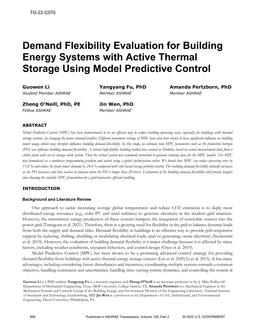Click here to purchase
Model Predictive Control (MPC) has been demonstrated to be an efficient way to reduce building operating costs, especially for buildings with thermal storage systems, by changing the power demand profiles. Different parameter settings of MPC have also been shown to have significant influence on building power usage, which may therefore influence building demand flexibility. In this study, we estimate how MPC parameters such as the prediction horizon (PH) can influence building demand flexibility. A virtual high-fidelity building testbed was created in Modelica based on actual measurement data from a chiller plant with an ice storage tank system. Then the virtual system was randomly perturbed to generate training data for the MPC models. The MPC was formulated as a nonlinear programming problem and solved using a global optimization solver. We found that MPC can reduce operating costs by 15.8 % and reduce the peak power demand by 24.8% compared with rule-based storage-priority control. The building demand flexibility initially increases as the PH increases and then reaches its plateau when the PH is longer than 20-hours. Evaluation of the building demand flexibility will provide insights into choosing the suitable MPC formulation for a grid-interactive efficient building.
Product Details
- Published:
- 2022
- Number of Pages:
- 9
- Units of Measure:
- Dual
- File Size:
- 1 file , 2.8 MB
- Product Code(s):
- D-TO-22-C076
- Note:
- This product is unavailable in Russia, Belarus
